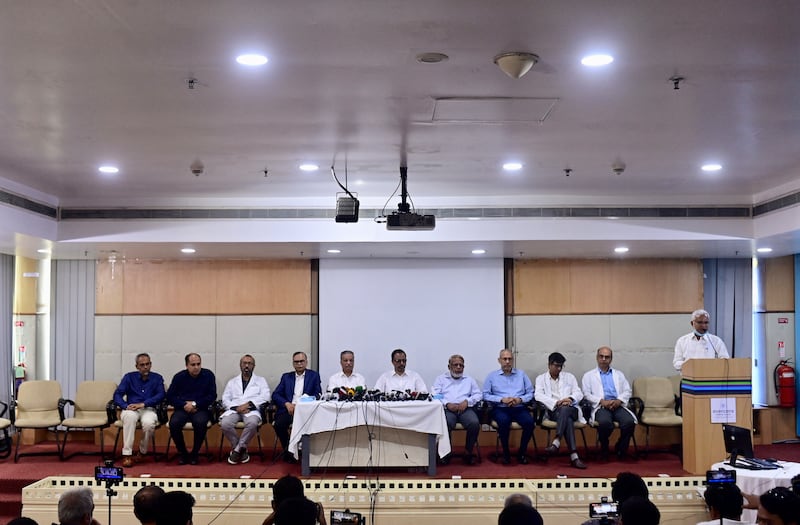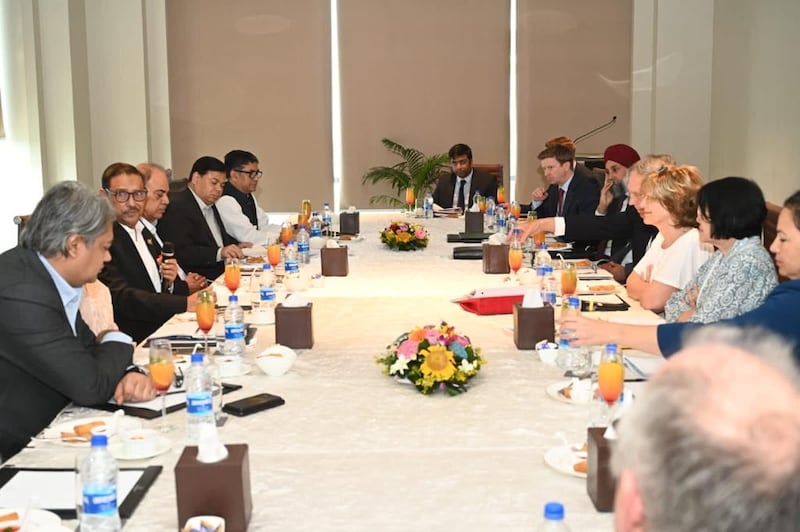Bangladeshi opposition leader Khaleda Zia could die anytime if the government keeps refusing to allow her to travel overseas for advanced treatment of cirrhosis of the liver and other illnesses, a panel of doctors told reporters in Dhaka on Monday.
Zia, 78, is a former three-time prime minister but she is effectively under house arrest for corruption convictions, while the ruling Awami League has steadfastly rejected requests by her Bangladesh Nationalist Party (BNP) to seek medical care abroad.
“She’s at high risk of death anytime. You wanted to know how long we can carry on like this - we just say that her risk of death is much higher, anytime,” Dr. Nooruddin Ahmad, a member of a medical board representing Zia’s physicians, said during a press conference.
The 15-member panel consists of her personal doctors and senior medical staff at the Evercare Hospital, a private care facility in Dhaka where Zia has been hospitalized since August.
“She was given four bags of blood. Her health situation is now very complex and difficult,” said Professor Fakhruddin Mohammad Siddiqui, a member of the panel. “She is at risk of death.”
Zia is the bitter foe of Prime Minister Sheikh Hasina, who has ruled Bangladesh uninterrupted since 2009, despite allegations that her party has tampered with general elections since then.
“Every day I hear that she is dying. She is about eighty. So it’s about time. There’s no point in shedding tears,” Prime Minister Hasina said last week at a social reception in London.

The BNP this year staged street protests to demand that Hasina and her Awami League step aside to allow a neutral caretaker government to take over during the next general election, which is due in December or January. But the Awami League has also refused to concede to the demand of BNP, which says it won't contest the race unless a caretaker administration is in place.
Meanwhile, officials from Zia’s party told a visiting delegation from the U.S. that Bangladesh could not hold free and fair elections in the coming months under present conditions.
“Under Sheikh Hasina, a fair election is impossible,” Amir Khasru Mahmud Chowdhury, a member of the BNP’s standing committee, told reporters after he had met the delegation. “[The government] has formed an institutionalized scheme to steal the votes.”
The American delegation also met with officials from the Awami League but did not issue any statements on Monday.
“They asked us whether there was any way to compromise with the BNP’s demands. We said the BNP blocked the path of compromise by demanding that the prime minister must resign,” Obaidul Quader, Awami’s secretary general who led his party in the separate meeting with the foreign delegation, told reporters afterwards.
A six-member delegation representing the National Democratic Institute and the International Republican Institute, which are both funded by the American government, arrived in Bangladesh at the weekend for a six-day visit to assess the pre-election conditions in the South Asian nation.
Hasina’s government has been at odds with the Biden administration lately over concerns expressed by U.S. officials about the climate for free and fair elections as well as U.S. criticism of her government’s record on human rights.
Critics have accused her government of turning increasingly authoritarian.
The last two elections have been controversial. The 2014 polls were boycotted by the opposition, and the 2018 iteration, in which the ruling coalition won in more than 90% of the parliamentary constituencies, faced widespread accusations of fraud.
Out of treatment options
Chowdhury, the BNP leader, told BenarNews that the party raised the issue of Khaleda Zia’s treatment by the Awami League and her poor health with the visiting Americans as well.
“We said that the government sentenced her to imprisonment in a fabricated case and now it’s pushing her to death,” he said.
The septuagenarian former prime minister was given a 17-year prison sentence in 2018 on allegations of corruption that her party maintains were politically motivated.
She was released by an executive order from Prime Minister Hasina during the height of the COVID-19 pandemic in 2020, but was barred from traveling abroad, including for medical care.

Zia has a host of complex ailments, including liver cirrhosis, arthritis, and heart complications, according to her doctors, and she has been hospitalized four times in recent years.
Her doctors recommend a procedure called Transjugular Intrahepatic Portosystemic Shunt (TIPS), which establishes an artificial channel within the liver. They said no medical facility in Bangladesh could conduct this life-saving procedure.
“All available medical options in Bangladesh are exhausted,” said Professor Shahabuddin Talukder, a cardiologist who heads the medical board. “If we could have performed the TIPS two years ago, she would not have had fluid accumulation in her stomach and chest, and she would not have had any bleeding in her stomach.”
“We are unanimous that there is still time for the treatment if arrangements are made for her liver transplant and the TIPS at an advanced facility abroad,” he said.
